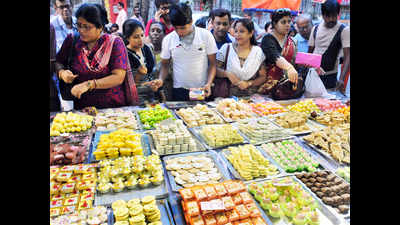Trending
This story is from November 19, 2017
Pedas for boys, jalebis for girls: In Goa, even sweets have gender

PANAJI: In a quaint village in the northern tip, a single firecracker burst heralds the arrival of a baby girl. Faraway in a town, another girl is born and jalebis are distributed. In village after village and town after town, across castes and religions in Goa, the gender discrimination begins.
It is no secret that in both urban and rural areas, jalebis or barfis are distributed to indicate the birth of a girl child, and pedas to celebrate a boy child.
“When a boy is born, one or two boxes of crackers are burst and villagers know the gender of the child. This is only the start of gender discrimination that the girl faces all through her life,” says Bicholim-based social activist Ramesh Gauns.
The recently-released gender vulnerability index (GVI) has ranked Goa as the best place for a female to live in, but ask around and in hushed tones Goans speak of regressive rituals still being practiced despite the state’s laws that ensure more equality to women than in other Indian states.
“I know of a woman who has been prohibited from touching her child because she is menstruating. The child is only a few months old. For non-Goans, Goa is a liberal society. But, it is only a myth that we have created,” she says. Rituals like breaking a woman’s bangles when the husband is dead is usually connected with states like Bihar, which has emerged worst on the GVI. But Goa’s villagers say these practices exist as much in the state.
“Across caste and religions in Goa, the tradition of sending ‘vhojem’ (a basket full of sweets) to the husband’s home during festivals is practiced. In many places, this has to be sent throughout the woman’s lifetime. Though there may not be a demand for dowry, but there are certain gold ornaments expected to be gifted to the girl by her parents like patle and todde bangles. That is why if a family has two daughters they are still pitied by friends and family,” says a villager from Sattari.
Goa has a uniform civil code, which gives women several rights that females in other states don’t have. “But families continue to see women as a burden because they feel if their property is equally divided between the son and the daughter, the daughter’s share is going to another family, whereas the son retains the property for the family,” says a female lawyer from Tiswadi village.
Despite Goa having one of the highest literacy rates in the country, Bambolkar reckons that education has not been able to change the mindsets. “We have failed to unlearn certain practices with changing times.”
It is no secret that in both urban and rural areas, jalebis or barfis are distributed to indicate the birth of a girl child, and pedas to celebrate a boy child.
“When a boy is born, one or two boxes of crackers are burst and villagers know the gender of the child. This is only the start of gender discrimination that the girl faces all through her life,” says Bicholim-based social activist Ramesh Gauns.
The recently-released gender vulnerability index (GVI) has ranked Goa as the best place for a female to live in, but ask around and in hushed tones Goans speak of regressive rituals still being practiced despite the state’s laws that ensure more equality to women than in other Indian states.
“I have travelled and have gone trekking while menstruating, but when at home, I cannot step outside my room,” says Goa university research scholar Tanvi Kamat Bambolkar, a resident of Bandoda village in Ponda.
“I know of a woman who has been prohibited from touching her child because she is menstruating. The child is only a few months old. For non-Goans, Goa is a liberal society. But, it is only a myth that we have created,” she says. Rituals like breaking a woman’s bangles when the husband is dead is usually connected with states like Bihar, which has emerged worst on the GVI. But Goa’s villagers say these practices exist as much in the state.
“Across caste and religions in Goa, the tradition of sending ‘vhojem’ (a basket full of sweets) to the husband’s home during festivals is practiced. In many places, this has to be sent throughout the woman’s lifetime. Though there may not be a demand for dowry, but there are certain gold ornaments expected to be gifted to the girl by her parents like patle and todde bangles. That is why if a family has two daughters they are still pitied by friends and family,” says a villager from Sattari.
Goa has a uniform civil code, which gives women several rights that females in other states don’t have. “But families continue to see women as a burden because they feel if their property is equally divided between the son and the daughter, the daughter’s share is going to another family, whereas the son retains the property for the family,” says a female lawyer from Tiswadi village.
Despite Goa having one of the highest literacy rates in the country, Bambolkar reckons that education has not been able to change the mindsets. “We have failed to unlearn certain practices with changing times.”
End of Article
FOLLOW US ON SOCIAL MEDIA











